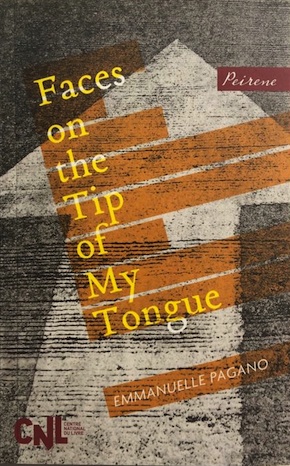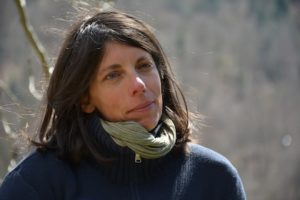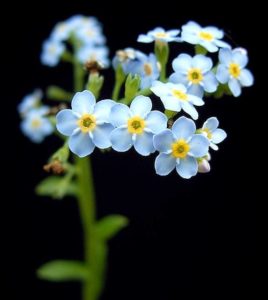The short cut
by Emmanuelle Pagano
“Endlessly beautiful and poignant.” Le Monde
I look so much like her, it upsets them. They think they’re seeing her, seeing her returned, seeing her returning. They take me for a revenant. I’ve never returned, though; I haven’t seen my family since then. Since I can’t remember when. Actually I do know, since the death of our grandmother. They talk to me about that time when I was already another, or rather another was me, at that family wedding when a woman thought she was me, having been mistakenly invited by my cousin, the bride’s mother, the one I look like, looked so much like. As though it was just like me to take someone else’s place. But now my cousin is dead and they know it’s actually me here, me and not another, me looking so much like her. Not her. We were almost the same age, to within a few days. We were a kind of almost-twins. I’m me now, just me. I am neither my cousin nor that ill, washed-up impostor at her daughter’s wedding.
It’s quite late and our shadows are long on the cemetery pathways. We walk with our backs to the sun and the shadows stretch before us, as though they were leading the procession. My cousin has preceded me to this place where shadows don’t need the sun. She wanted to be cremated but her children have refused. In any case, she has already burned. She killed herself in a car accident and the car caught fire. She went up in smoke before her funeral and we haven’t got much to bury. I think she decided to kill herself, I think it was on purpose. She never believed in life; despite her children and her husband, she was never alive. I knew her well before, before the husband and children, before she began to pretend. She lied herself a comfortable life, forgetting her girlhood fears, but they returned once the children were grown up, they came back, they’d always been there most likely. That’s what I think, but I don’t know; we’d lost touch. I think I know her better than anyone, even now she’s dead. Sometimes it’s as though I knew myself, because of the way the others look at me, because of those words: you’re so alike you could be her. We can’t know ourselves, only catch hold of words and images in other people’s minds to try to see more clearly inside ourselves.
I’ve been around; I’ve lived it up, as we used to say. I’m one of the last hippies, the complete opposite of my cousin, but perhaps we were both trying to escape from the same life. The same fear of life, the same desire to live even so, but such an impossible desire, such an irresolute one. When we were teenagers she used to say she wanted to escape from this war that was our lives. I would answer that the only way to escape war was to make war. To live. I’d scarpered as soon as our grandmother died, straight from the cemetery, hitchhiking to the station. My cousin was the only one who knew about my plans, a few months before we turned eighteen. I think I threw myself into life the same way she threw her car against the crash barrier.
I understand. She suffered from the heaviness of a body that feels like lead when you don’t want to live any more. She died light and burned up, her body nothing more than blisters and blackened air.”
The paramedics found the wreck in the thickets of broom that spread their yellow scent everywhere, the roadside broom. Forget-me-nots and broom, they’re not domestic flowers. Just like the forget-me-nots whose blue and pink petals we see even in the concrete high-rise outskirts of Paris, broom grows everywhere, on roadsides, even by motorways. Blue forget-me-nots were her favourite flowers. I had told her that they’re called ‘remember’ in German and ‘don’t forget me’ in English. I brought some to add to her grave. To give a bit of weight to the almost empty coffin. But my bouquet doesn’t weigh much and that’s how it should be. She said that she suffered from her own weight, or that’s what her children told me. She suffered from her weight even though she was skinny, and they didn’t understand that. I do. I understand. She suffered from the heaviness of a body that feels like lead when you don’t want to live any more. She died light and burned up, her body nothing more than blisters and blackened air.
I’m afraid she will weigh heavily, though, in my memory, in the memories of her children and husband, and the people who will remember her. Did she think of that?
I came back specially for the funeral. Her daughter found me through the internet. I took that road again in a hire car, in the opposite direction, from the station to the cemetery. I got a bit lost after so many years, so I asked a lady the way to the cemetery and she kindly showed me a short cut. It was easy to find and I arrived in plenty of time. Something wasn’t right, and it wasn’t that I was early; no, it was the route I’d taken, the short cut. I was lost. I wasn’t lost on the road but in my mind. It had gone too fast, this return with the short cut. The drive to the cemetery wasn’t a question of time, and I didn’t mind if I was late or early. This drive was a journey, with stages to be gone through in the city. The short cut avoided the city centre and its outskirts, and what we used to call the zone, the business and shopping centres, a sort of city beyond the city that frightened and fascinated us when we were children. The short cut was a country road that had brought me almost directly from the station to the cemetery. But I had stages to pass through: the city, the river at its edge, between the centre and the zone, the narrow iron bridge between the two where the city seemed to choke and where the traffic jams were all part of the journey, the zone itself, the industrial no-man’s-land, the in-between places. I needed them so I could pass from one world to the other. I needed markers, segments, crossings. I needed the bridge, to pass from one reality to another, from one vision of reality to the other, from hers to mine.
I needed the return. The return to her, to us, the return to me.
I turned the car round and went back to the usual route, in the opposite direction. I arrived in her reality just as the coffin was being lowered. Just in time to fling in my forget-me-nots and light up the shadows with their little blue spots. This reality was reassuring for me, for her. I knew what frightened her most: it was the life that I had chosen where nothing is known. She had tried to persuade me not to leave, telling me that other places were the same as here but worse, because they were unknown. The unknown was what made her so vulnerable. Now we’re reassured, she and I. We know where we are. She no longer weighs a thing, and I have returned.
From the collection Faces on the Tip of My Tongue (Peirene Press, £12)
 Emmanuelle Pagano was born in Rodez (Aveyron) in 1969. Her novels have been translated into more than a dozen languages, and she has won multiple awards for her writing, including the EU Prize for Literature and the French Ecology Novel Prize. Her first book published in English was Trysting (And Other Stories, 2016). Faces on the Tip of My Tongue, translated by Jennifer Higgins and Sophie Lewis, is published by Peirene Press.
Emmanuelle Pagano was born in Rodez (Aveyron) in 1969. Her novels have been translated into more than a dozen languages, and she has won multiple awards for her writing, including the EU Prize for Literature and the French Ecology Novel Prize. Her first book published in English was Trysting (And Other Stories, 2016). Faces on the Tip of My Tongue, translated by Jennifer Higgins and Sophie Lewis, is published by Peirene Press.
Read more
emmanuellepagano.wordpress.com
Jennifer Higgins and Sophie Lewis translated Emmanuelle Pagano’s previous collection Trysting to much acclaim. Individually, Jennifer has translated multiple books from French and Italian and Sophie’s translations have been shortlisted for the Scott Moncrieff Prize and the Republic of Consciousness Prize.
@JennyTranslates
@sophietimes


